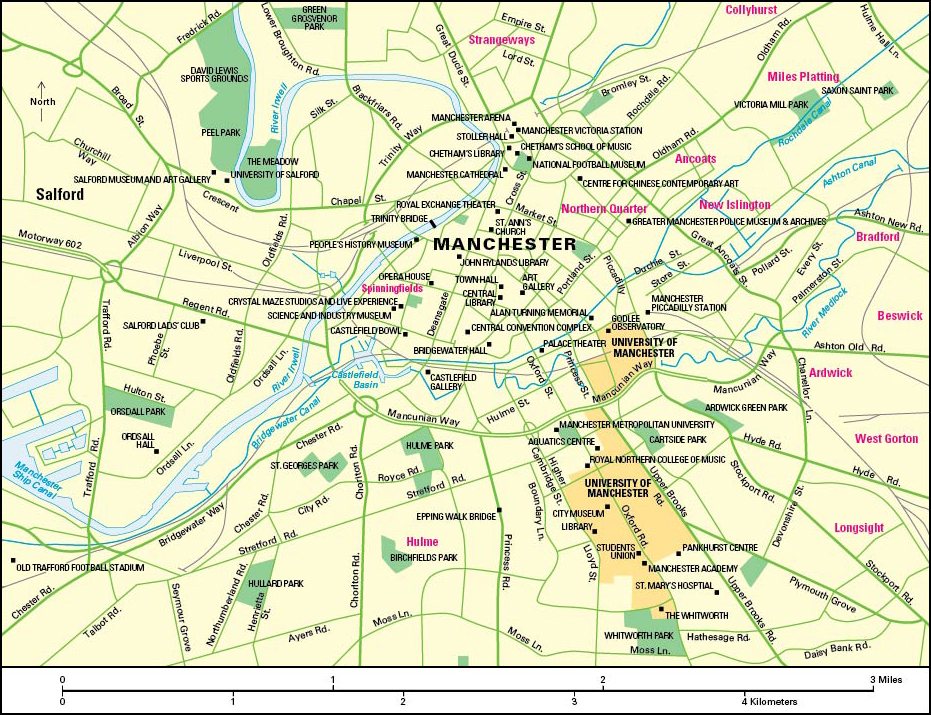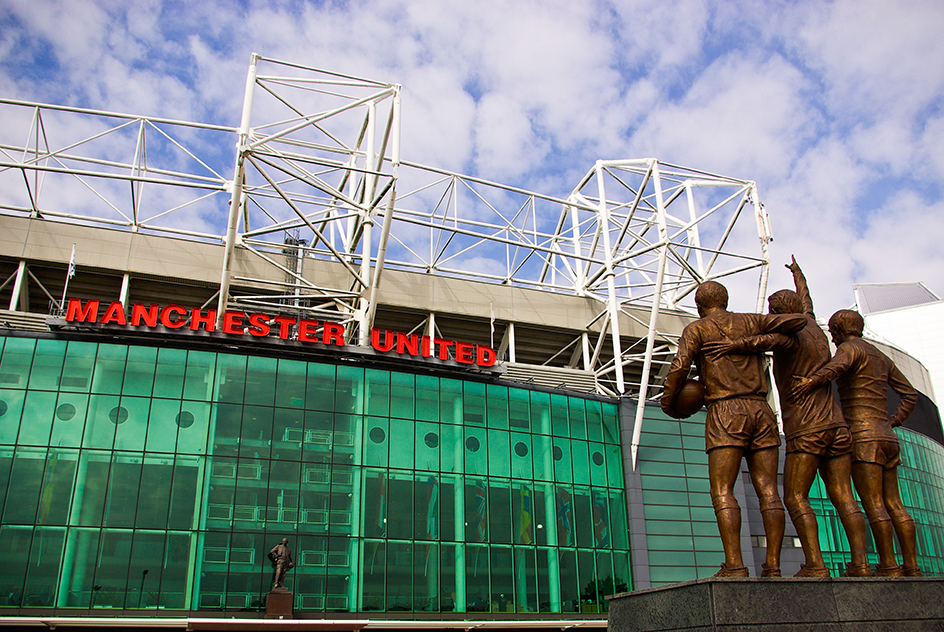Manchester (pop. 551,938) is one of the largest cities in England. Manchester is the center of Greater Manchester, England’s third largest metropolitan county (a kind of local government area). Only the metropolitan counties of London and Birmingham have more people. Greater Manchester is one of the United Kingdom’s chief economic and cultural centers. Manchester’s inhabitants are known as Mancunians.

Manchester lies on the Irwell River about 35 miles (56 kilometers) east of the Irish Sea, an arm of the Atlantic Ocean. The Manchester Ship Canal links the city to the mouth of the Mersey River, which flows into the Irish Sea. The canal makes Manchester an inland port.
The city.
Manchester Cathedral, a famous city landmark, was built in the 1400’s. Manchester also has many buildings that date from the 1800’s, when the city became a major industrial and trade center. These buildings include the magnificent Town Hall, completed in 1877. A number of the buildings constructed during the 1800’s to serve the needs of industry and trade are now used for other purposes. For example, the Royal Exchange, formerly a trading center for the British cotton industry, is now a theater. Many historic buildings stand in the Northern Quarter, northwest of downtown. The neighborhood is known for its restaurants, shops, and live-music venues.

Bridgewater Hall, a concert hall that opened in 1996, is the home of the world-famous Hallé Orchestra. The Imperial War Museum North, housed in a striking metal-clad building on the banks of the ship canal, opened in 2002.
During the 1970’s, a huge educational district was developed south of Manchester’s downtown area. The district is more than 2 miles (3.2 kilometers) long and includes the University of Manchester, Manchester Metropolitan University, and the Royal Northern College of Music.
Economy.
Manchester is one of the United Kingdom’s chief centers of trade and finance. Its port handles millions of tons of cargo annually. The city has many banks and insurance companies. The Manchester area is also a leader in manufacturing in the United Kingdom. Products include chemicals, clothing and textiles, computers, electronic equipment, industrial machinery and machine tools, paper, precision instruments, and processed foods. Manchester has an international airport. The city is a center of railroad transportation and of radio and television broadcasting.
Culture.
Manchester has long been an important contributor to British music and culture. In the mid-1800’s, workers at the city’s mills and factories began to form brass bands and orchestras. In the 1900’s, the city gained attention for its many influential popular-music groups, including Herman’s Hermits, Joy Division, Oasis, The Smiths, and others. The rivalry of the city’s football (soccer) teams, Manchester City and Manchester United, draws interest from around the world. Manchester is a multicultural city whose residents come from diverse ethnic and religious backgrounds. People from such places as Africa, the Caribbean region, and Pakistan have made important contributions to the city.
History.
About A.D. 80, the Romans built a fort on the site of what is now Manchester. Anglo-Saxons from northeastern England established a village there about 700. By the 1500’s, Manchester had become an important center for the wool trade.
During the 1800’s, Manchester developed into one of the world’s chief centers for the production of cotton textiles. The city and its surrounding communities grew into a major industrial area. Large numbers of people moved there to find jobs. The Manchester Ship Canal opened in 1894 and made the city an inland port (see Canal (Major canals in other countries)). The production of cotton textiles declined steadily during the first half of the 1900’s.
Thousands of immigrants from the Caribbean Islands and South Asia moved to Manchester in the second half of the 1900’s. From the 1960’s to the 1980’s, the closures of many textile mills, steel mills, and other factories left many Mancunians out of work. New housing estates (developments) were built in the surrounding communities, and thousands of people moved to them from the city center. Jobs in service industries, including catering, education, finance, health care, and retail trade, employed increasing numbers of workers. By the 1990’s, the development of new businesses in the area helped Manchester retain its economic importance.
In 1996, a bomb planted in downtown Manchester by the Irish Republican Army injured more than 200 people and damaged or destroyed many buildings. The city undertook a major rebuilding and restoration project that revitalized the downtown area. In 2017, an Islamic terrorist suicide bomber killed 22 people and injured many others after a concert by American pop star Ariana Grande at Manchester Arena.
The Greater Manchester Combined Authority formed in 2011. It is run by leaders of the region’s metropolitan districts (a kind of local government area). The authority coordinates the planning and development of transportation, housing, and environmental projects in the Greater Manchester area.
